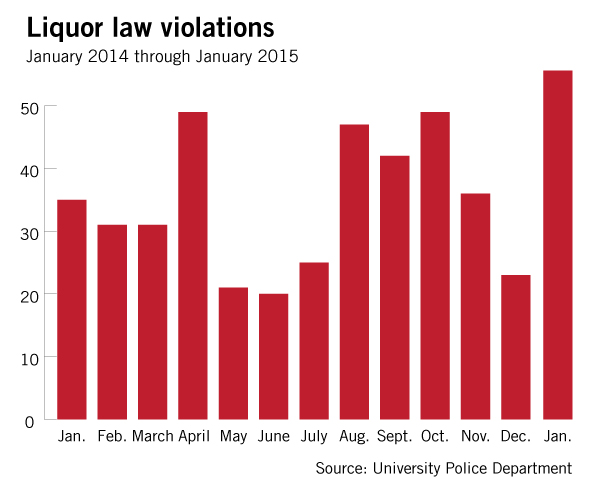The University Police Department recorded a larger number of liquor law violations last month than any month in 2014.
Campus police logged 55 liquor law violations in January. That’s six incidents more than both October and April of last year, which tied for the largest number of reported violations in 2014, according the University’s crime log.
Senior Associate Vice President for Safety and Security Darrell Darnell said there was no “specific incident” that caused the number of violations to increase in January as “the violations occurred throughout the month.”
“GWPD officers continue to patrol for signs of underage drinking and will take the appropriate action when violations occur or are uncovered,” he said in an email.
Alcohol violations on campus have ebbed and flowed over the past four years. From 2012 to 2013, violations soared 48 percent to a total of 431. The number of alcohol violations in 2014, which will officially be released in the University’s annual security report in October, fell to 409, according to crime logs.
This past fall, Darnell said alcohol violations increased in 2013 because University police were starting to actively seek out students who looked intoxicated.
Matthew Malhiot, a consultant at Forensic Alcohol Consulting and Training, said an increase in violations could discourage students from drinking on campus.
“If you, as a student, think there’s a probability of getting caught, you’ll be deterred from that offense,” he said.
University spokesman Kurtis Hiatt said GW offers resources through the Student Health Center concerning alcohol education.
“The University is committed to promoting the health and safety of GW students and offers many services and resources to educate and support healthy lifestyles and responsible decision-making about alcohol and drugs,” he said in an email.
Hiatt added that GW “continually” reviews its alcohol and other drug-related policies and education programs.
David Hanson, an emeritus professor at the State University of New York in Potsdam who has studied college drinking for more than 30 years, said increasing enforcement could push students to drink “underground.”
More security measures could encourage students to smuggle alcohol into residence halls, he said.
“They think that it’s unfair and unjust, they can have a reaction, which is exactly to do what is prohibited,” Hanson said.







